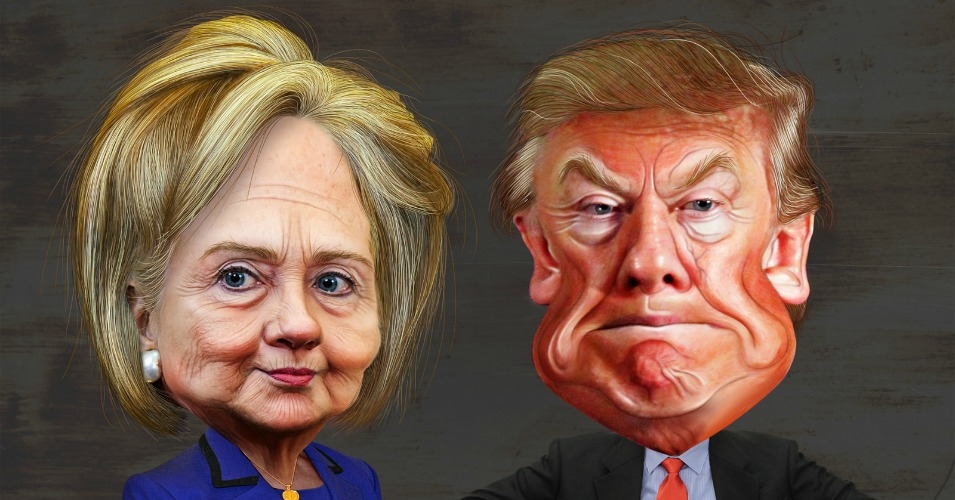
Wall Street Journal columnist Peggy Noonan wrote earlier this year that the only person who can beat Republican presidential nominee Donald Trump is Trump himself, and so far voters think that’s exactly what he’s doing.
A new Rasmussen Reports national telephone and online survey finds that 45% of Likely U.S. Voters believe Trump’s biggest political enemy this election cycle is himself. Just 29% say his biggest foe is Hillary Clinton and the Democratic party, while 20% say it’s the national media. Despite Trump’s tense relations with his party’s traditional leadership, just five percent (5%) think other Republicans are his biggest enemy. (To see survey question wording, click here.)
By contrast, 49% believe Trump and the Republican party are Democratic nominee Hillary Clinton’s biggest enemy. But a sizable 38% say the former secretary of State is her own worst enemy. Only nine percent (9%) see the national media as her biggest rival, while two percent (2%) say it’s other Democrats.
Even among Republicans, just 39% think Clinton and the Democratic party is Trump’s biggest enemy. Sixty-three percent (63%) of Democrats, on the other hand, regard Trump and the GOP as Clinton’s biggest foe. Republican voters are only slightly more likely to believe the national media (28%) is a bigger enemy of their nominee than he is himself (26%).
Among voters not affiliated with either major party, 47% see Clinton as her own biggest enemy, and 44% say the same of Trump.
(Want a free daily e-mail update? If it’s in the news, it’s in our polls). Rasmussen Reports updates are also available on Twitter or Facebook.
The survey of 1,000 Likely Voters was conducted on August 7-8, 2016 by Rasmussen Reports. The margin of sampling error is +/- 3 percentage points with a 95% level of confidence. Field work for all Rasmussen Reports surveys is conducted by Pulse Opinion Research, LLC. See methodology.
A post-convention bounce has given Clinton a four-point lead over Trump, her biggest lead since June in our weekly White House Watch survey. We’ll update those numbers tomorrow morning.
Women feel more strongly than men do that Trump’s biggest political enemy is himself, while men are more likely to feel that way about Clinton.
Those under 40 tend to believe Trump’s biggest problem is his political opposition. Older voters are more likely to say he is his own worst enemy. Voters in all age groups see Trump and the GOP as Clinton’s biggest rival, but nearly as many of those over 40 see the candidate herself as her biggest enemy.
Seventy-five percent (75%) of all voters believe that when it comes to covering prospective presidential candidates, the media is more interested in creating controversies about them than it is in reporting where they stand on the issues. As in previous presidential election cycles, voters expect reporters covering political campaigns to help their favorite candidates and think it’s far more likely they will help Clinton than Trump.
Trump has consistently butted heads with the leaders of his own party and taken positions at odds with GOP policy for the last 30 years. His unscripted and frequently non-politically correct asides, while crucial to his primary success, are now viewed by the media and even members of his own party as a major problem in the general election cycle. Sixty-six percent (66%) of Republicans believe that most top GOP leaders do not want Trump to be elected president of the United States.
Despite the rift among Democrats between the party establishment represented by Clinton and the more progressive wing that supported Vermont Senator Bernie Sanders in the primaries, Democratic voters tend to believe their party should be more like Clinton than Sanders. Even before their convention opened last month, 78% of Democrats said Sanders’ supporters are likely to support Clinton in the fall.
Perhaps Clinton’s biggest challenge this election cycle has been controlling the damage stemming from controversies during her tenure as secretary of State. Forty-nine percent (49%) of voters believe Clinton lied to the families of those killed in the 2012 terrorist attacks in Benghazi, Libyawhen she told them the deaths were the result of an inflammatory anti-Muslim video on YouTube.
The FBI has concluded that Clinton potentially exposed top secret information to hostile countries when she illegally used a private e-mail server as secretary of State. Most voters disagree with FBI Director James Comey’s decision not to seek a criminal indictment against the Democratic presidential nominee.
President Obama recently denounced Trump as “unfit to serve” and “woefully unprepared to do this job.” Nearly half of voters agree, but they’re not so sure Clinton is up for the job either.
Additional information from this survey and a full demographic breakdown are available to Platinum Members only.



Expositores: Oscar Vidarte (PUCP) Fernando González Vigil (Universidad del Pacífico) Inscripciones aquí. Leer más
Una retrospectiva para entender los próximos cuatro años. Leer más
En la conferencia se hará una presentación de los temas más relevantes del proceso de negociación se llevó a cabo desde el 2012, así como del acuerdo de paz firmado entre el Gobierno colombiano y la guerrilla de las FARC a finales del 2016. Se analizarán los desafíos y las... Leer más
El Observatorio de las Relaciones Peruano-Norteamericanas (ORPN) de la Universidad del Pacífico es un programa encargado de analizar y difundir información relevante sobre la situación política, económica y social de Estados Unidos y analizar, desde una perspectiva multidisciplinaria, su efecto en las relaciones bilaterales con el Perú.
© 2026 Universidad del Pacífico - Departamento Académico de Humanidades. Todos los derechos reservados.

